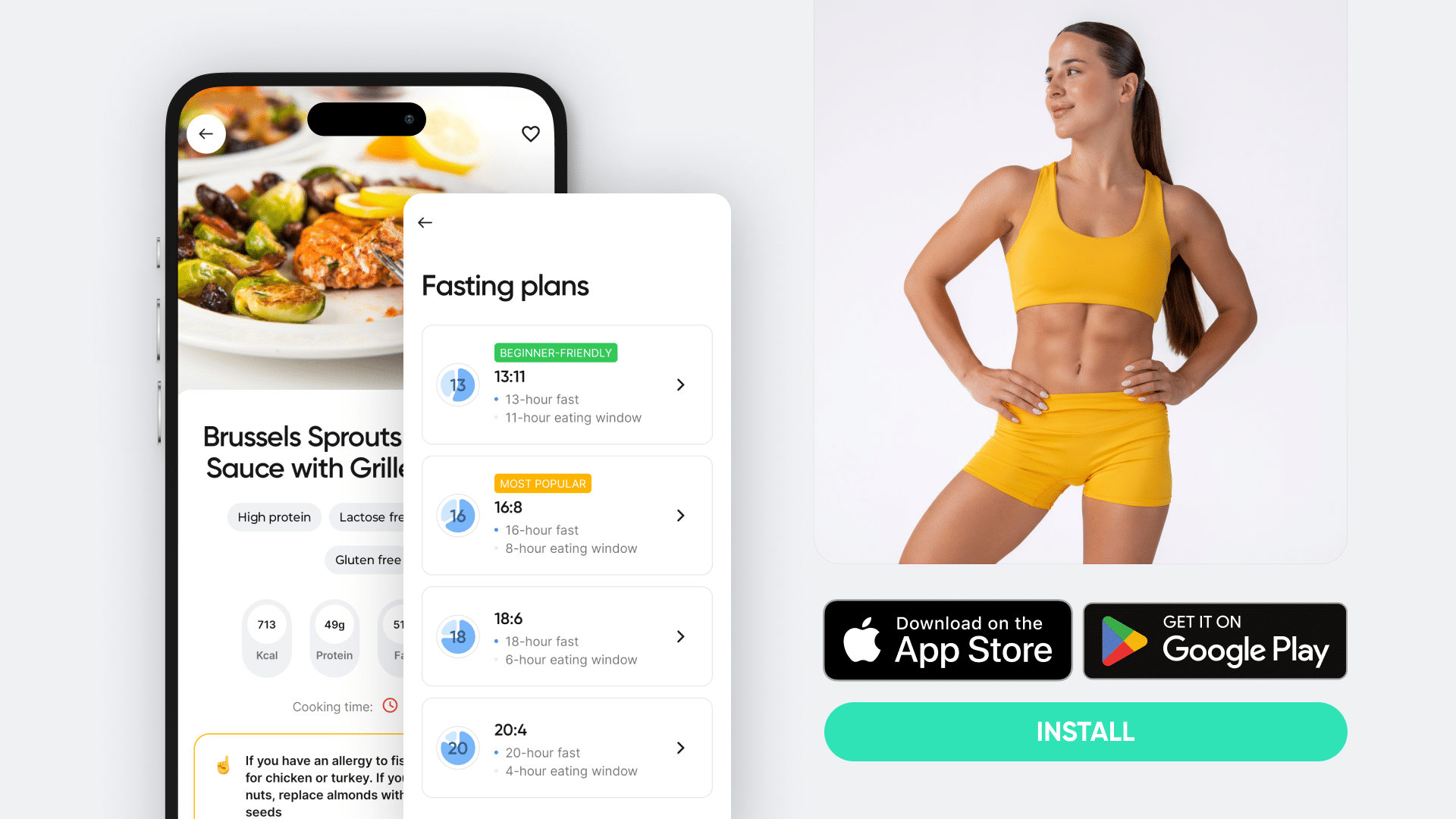Intermittent fasting (IF) has emerged as the answer for many who are trying to achieve weight loss. If you’ve recently got started and you are not losing weight, you may feel frustrated. And, that’s completely understandable. All effort with no results, not a good time.
But before you throw in the towel, there may be some factors that you need to consider to understand why the scale is not moving.
In this article, we are going to explore all the possible reasons why you are not losing weight on a 16:8 fasting (or any other type of fasting). Additionally, we are going to explore ways to help you get the desired results and how to break through a weight loss plateau.
What Is Intermittent Fasting?
Intermittent fasting is not a traditional diet like keto or paleo. It is a way of modifying your eating patterns by cycling the hours you eat and fast. So, unlike traditional diets, it doesn’t tell you what you should or should not eat, but rather when you should be eating.
There are several types of fasting, each with its own fasting and eating windows:
- 16:8 method: This method involves fasting for 16 hours and having an 8-hour eating window. For example, you may have an eating window of 12 pm to 8 pm and then fast from 8 pm until 12 pm the next day.
- 5:2 diet: Here, it involves eating normally for 5 days of the week and then restricting your calorie intake to 500-600 calories for the remaining 2 days.
- Alternate-day fasting: Just like the name suggests, you alternate the days you eat regularly and the days of fasting. On fastingdays, you may consume very few calories or none at all.
- Eat-stop-eat: This method involves fasting for 24 hours once or twice a week.
Keep in mind that before you make any changes to your eating patterns, it’s important to consult with a health professional. They can guide you on which is the best type of fasting, based on your goals and needs.
Why Am I Not Losing Any Weight on Intermittent Fasting?
Many jump into the world of intermittent fasting with high hopes but little planning, leading to key errors that can affect your overall weight loss results. Here are some of the reasons why you are 2 weeks into intermittent fasting, but no weight loss.
You Are Not Aware of Your Intake
One of the biggest misconceptions about intermittent fasting is the idea that you can eat whatever you want during your eating window and still lose weight. Unfortunately, weight loss is not just about when you eat but also about what and how much you eat.
Overeating, even within your eating window, can negate the caloric deficit necessary for weight loss (4).
How to solve it: Make sure you are keeping track of the calories you are having throughout the day. You can use a calorie tracker or a meal plan to stay within your daily calorie limit during your eating window.
Your Macros Are All Wrong
Not all calories are created equal. A diet heavy in processed foods, sugars, and unhealthy fats, even if consumed within your eating period, can lead to inflammation, insulin resistance, and weight stalling (6).
Understanding and balancing your macros (carbs, proteins, and fats) can help you support your fasting protocol, which is crucial for optimal success.
How to solve it: Protein is one of the most important macros for weight loss. Research shows that it can help increase your fullness levels and promote weight loss (3). Now, this doesn’t mean that you should only eat protein; make sure you are having a balanced diet with an adequate protein intake.
Lean and toned up body isn’t just a far-fetched fantasy. Check out the BetterMe app and watch it propel your weight loss journey into high gear!
You Don’t Have Other Indicators of Progress
Relying solely on the scale to track progress can be deceptive. Weight fluctuates for various reasons, including water retention and muscle gain. Having other indicators of progress can help you determine if the fasting program is, in fact, working.
How to solve it: Measuring inches lost, observing how clothes fit, or noticing changes in energy levels and mental clarity can be great indicators that your health is moving in the right direction, as well as the fasting strategy.
You Are Not Sleeping or Handling Stress
Poor sleep and high stress levels wreak havoc on your body, particularly your hormones. Hormonal imbalances can affect your hunger levels, cravings, and weight.
Research shows that people who are sleep-deprived or under high stress levels seem to have more hunger, leading to more snacking and a higher calorie intake, resulting in weight gain (5).
How to solve it: Make sure you are getting 7-9 hours of high-quality sleep and have effective stress management techniques, such as meditation, yoga, breathing exercises, or walking.
You Are Not Staying Hydrated
Dehydration can often masquerade as hunger, leading to unnecessary snacking or overeating during your eating windows. The problem is that not a lot of people are aware of their daily water consumption, often leading to dehydration.
Staying hydrated, especially during your fasting hours, can help support your metabolism and help curb appetite.
How to solve it: Make sure you are thoroughly tracking your water intake. Place alarms or take a bottle of water with you to help you stay consistent with your water goals.
Read more: Green Tea Intermittent Fasting: Benefits and Side Effects
You Are Not Being Consistent
The best results, whether you are fasting or any other eating plan, are seen through consistency. If you are fasting from Monday to Friday, but over the weekend, you are not fasting and not tracking your meals, there is your problem.
How to fix it: For intermittent fasting to work, you need to stay as consistent as possible. Keep the same schedule, even during the weekends. And, if you are struggling during the weekends, plan ahead to make things easier for you.
The Fasting Plan is Not For You
Intermittent fasting isn’t a one-size-fits-all solution. While the popular 16:8 method may work for some, others may not be as successful. Others may find more success with other methods, such as the alternate-day fasting or the 5:2 approach.
How to solve it: Pay attention to the signs that intermittent fasting is not working. If you’ve tried fixing all the other problems, and you are still not losing weight, then it may be time to switch to another approach. Consult with a health professional to get a personalized plan to help you lose your desired weight.
If you are still gaining weight during fasting, check out our other article: Can Intermittent Fasting Cause Weight Gain.
How Long Does It Take For 16-8 Intermittent Fasting To Work?
Expectations vs. reality can differ significantly when it comes to how quickly you’ll see results when doing intermittent fasting. Generally, it may take anywhere from a few weeks to a couple of months before you start to notice any significant changes.
According to studies, people, on average, can lose from 0.8 to 13% of body weight during fasting (1). However, keep in mind that everyone’s body and metabolism are different.
In the beginning, you may experience faster weight loss since the body needs to adjust to the new eating pattern, often resulting in significant water loss. However, once the body adapts, it takes longer for it to use its fat reserves, which results in weight loss.
Keep in mind that factors like metabolic rate, age, gender, and activity can affect overall weight loss.
How Long Does It Take To Lose Weight on Intermittent Fasting?
There is no one-size-fits-all answer, but consistent adherence to a 16:8 fasting method can result in significant weight loss over 10-12 weeks (2). However, this can be influenced by the calorie intake during your eating windows, not just the fasting itself.
Additionally, there may be times when you are not losing weight on intermittent fasting, but instead you are losing inches. That is why it’s always important to have other indicators of progress when you are on a weight loss journey.
Looking for a way to break the vicious cycle of weight loss and tone up all the jiggly parts? Watch the extra pounds fly off and your muscles firm up with the BetterMe app!
How Do I Break My Weight Loss Plateau on Intermittent Fasting?
Hitting a plateau can be discouraging, but several strategies can help you overcome it. These include adjusting your eating window, including more whole foods into your diet, increasing your physical activity, and ensuring you are getting enough sleep. Sometimes, a short break from fasting can also reset your metabolism.
Read more: Intermittent Fasting and Running: A Winning Combination or a Terrible Mistake?
Tips To Get The Most Out of Intermittent Fasting
While we’ve already gone over some solutions to help promote weight loss, let’s summarize all the ways to help speed up weight loss on intermittent fasting.
- Track your food. Keep a food diary or use a tracking app to become more mindful of your caloric intake and macronutrient distribution.
- Eat whole foods. Base your meals around whole foods. Vegetables, fruits, lean protein, whole grains, and healthy fats can all provide essential nutrients without excessive calories.
- Experiment with your fasting schedule. Don’t be afraid to adjust your fasting window or try different intermittent fasting methods until you find the one that feels more natural and effective. If you want to start on a lower fasting schedule, try a 12-Hour Intermittent Fasting.
- Prioritize sleep and stress management. Include practices that promote restful sleep and reduce stress, such as medication or yoga, into your routine.
- Stay hydrated. Aim for at least half your body weight (pounds) in ounces of water. That means, if you weigh 100 pounds, you should strive for at least 50 ounces of water.
- Start exercising. Regular physical activity can help you stay active and result in a caloric deficit, which results in weight loss. If you are new to fasting and working out, check out our article on Intermittent Fasting Exercise.
FAQs
Why are there no results after 1 month of intermittent fasting?
Results may not appear after one month of intermittent fasting due to several factors, such as calorie intake, meal composition, and individual metabolism. It’s important to understand one’s eating habits and metabolism to ensure you are getting the right amount of food throughout your eating window.
Why intermittent fasting doesn’t work for some?
Intermittent fasting may not work for some due to several factors, like underlying medical conditions, inconsistent fasting patterns, or including more meals without noticing. Consult with a health professional to help you determine the reason why you are not losing weight while fasting.
What happens after 1 month of intermittent fasting?
After one month of intermittent fasting, people may experience improved insulin sensitivity, cellular repair, and potential weight loss. Keep in mind that consistency and adherence to healthy eating are essential for long-term results.
Why is my stomach getting bigger while fasting?
A larger stomach while fasting may result from increased water retention, gastrointestinal issues, or overeating during eating windows. If you are constantly getting a big stomach, monitor what you eat and stay hydrated to help alleviate bloating and discomfort.
The Bottom Line
Intermittent fasting offers a flexible framework for managing weight and improving health, but it’s not immune to the complexities of individual biology and lifestyle factors. If you are not seeing the weight loss results you anticipated, take a moment to review your approach, focusing on fasting intervals, dietary quality, and lifestyle habits.
Remember, weight loss is a marathon, not a sprint. Patience, experimentation, and commitment to understanding your body’s unique responses are key. And, as always, make sure you speak with a health professional to tailor your fasting and diet to your personal needs and health goals.
Intermittent fasting can unlock a path to better health and weight management, but it’s essential to approach it with knowledge, flexibility, and a readiness to adjust your strategy based on your body’s feedback.
DISCLAIMER:
This article is intended for general informational purposes only and does not serve to address individual circumstances. It is not a substitute for professional advice or help and should not be relied on for making any kind of decision-making. Any action taken as a direct or indirect result of the information in this article is entirely at your own risk and is your sole responsibility.
BetterMe, its content staff, and its medical advisors accept no responsibility for inaccuracies, errors, misstatements, inconsistencies, or omissions and specifically disclaim any liability, loss or risk, personal, professional or otherwise, which may be incurred as a consequence, directly or indirectly, of the use and/or application of any content.
You should always seek the advice of your physician or other qualified health provider with any questions you may have regarding a medical condition or your specific situation. Never disregard professional medical advice or delay seeking it because of BetterMe content. If you suspect or think you may have a medical emergency, call your doctor.
SOURCES:
- Intermittent fasting and weight loss. (pubmed, 2020)
- Is time‐restricted eating (8/16) beneficial for body weight and metabolism of obese and overweight adults? A systematic review and meta‐analysis of randomized controlled trials. (pubmed, 2023)
- Protein, weight management, and satiety. (pubmed, 2008)
- Optimal Diet Strategies for Weight Loss and Weight Loss Maintenance. (pubmed, 2021)
- Sleep Deprivation: Effects on Weight Loss and Weight Loss Maintenance. (MDPI, 2022)
- Ultra-Processed Diets Cause Excess Calorie Intake and Weight Gain: An Inpatient Randomized Controlled Trial of Ad LibitumFood Intake. (Cell, 2019)









